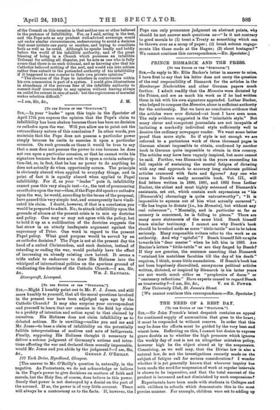[To rm. Enna or nu .. Nrworkr02..1 Sxa,—Might I humbly point
out to Mr. F. J. Jones, and still more humbly to yourself, that all the moral questions involved in the present war have been adjudged ages ago by the Catholic Church P It may also surprise your correspondent and yourself to learn that our enemies in the field lay claim to a probity of intention and action equal to that claimed by ourselves. His Holiness does not claim infallibility as to debated actions. He is unwilling—unlike you and me and Mr. Jones—to base a claim of infallibility on the potentially fallible interpretations of motives and acts of belligerents. Finally, supposing His Holiness thought it necessary to deliver a solemn judgment of Germany's actions and inten. tions affecting the war and declared them morally impeccable, would Mr. Jones and you abide by the judgment P—I am, Sir,
[The answer to Mr. O'Reilly's question is, naturally, in the negative. As Protestants, we do not acknowledge or believe in the Pope's power to give decisions on matters of faith and morals, but the Holy See, of course, does believe in this power. Surely that power is not destroyed by a denial on the part of the accused. If so, the power is of very little account. There will always be a controversy as to the facts. 'If, however, the
Pope can only pronounce judgment on abstract points, why should he not answer such questions es—" Is it not contrary to good morals to (1) treat a Treaty as something which can be thrown over as a scrap of paper ; (2) break solemn engage- ments like those made at the Hague; (3) shoot hostages P " We cannot continue this correspondence.—En. Spectator.]














































 Previous page
Previous page